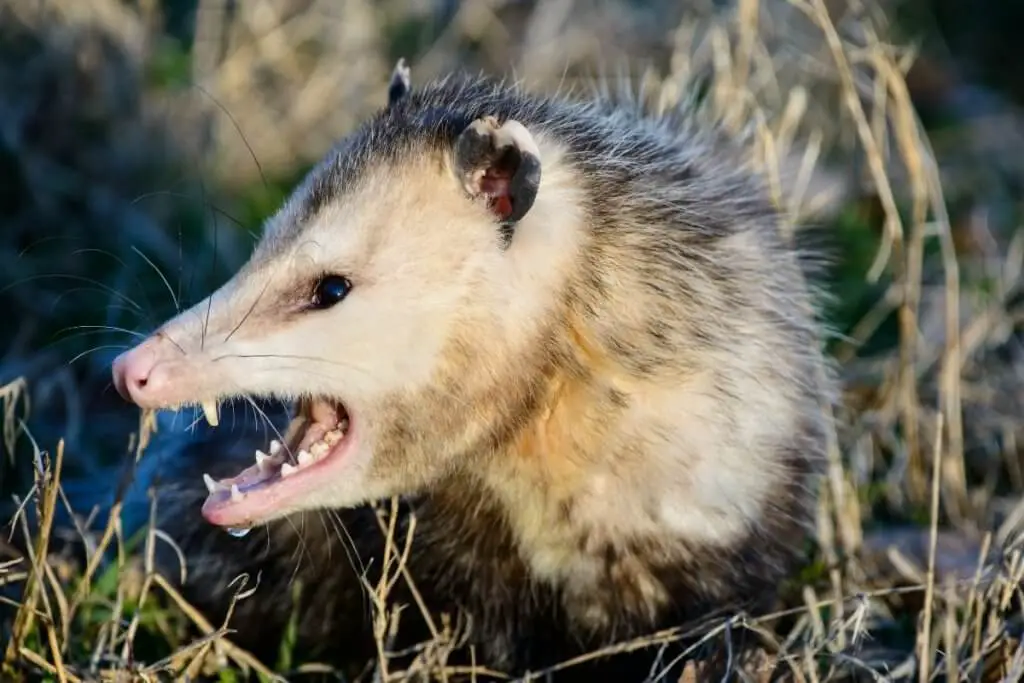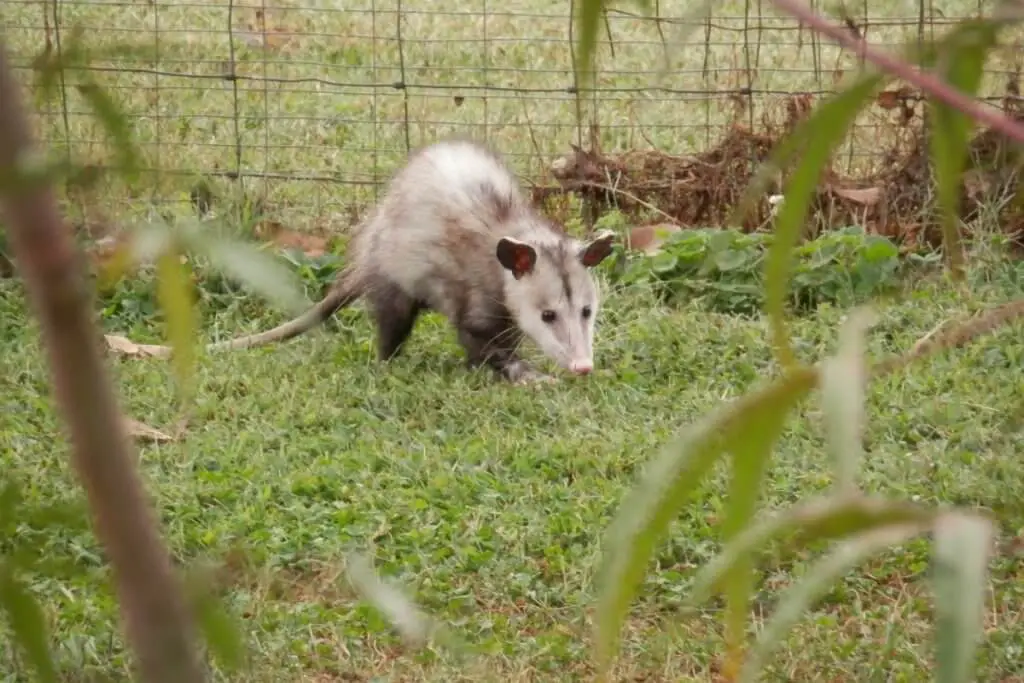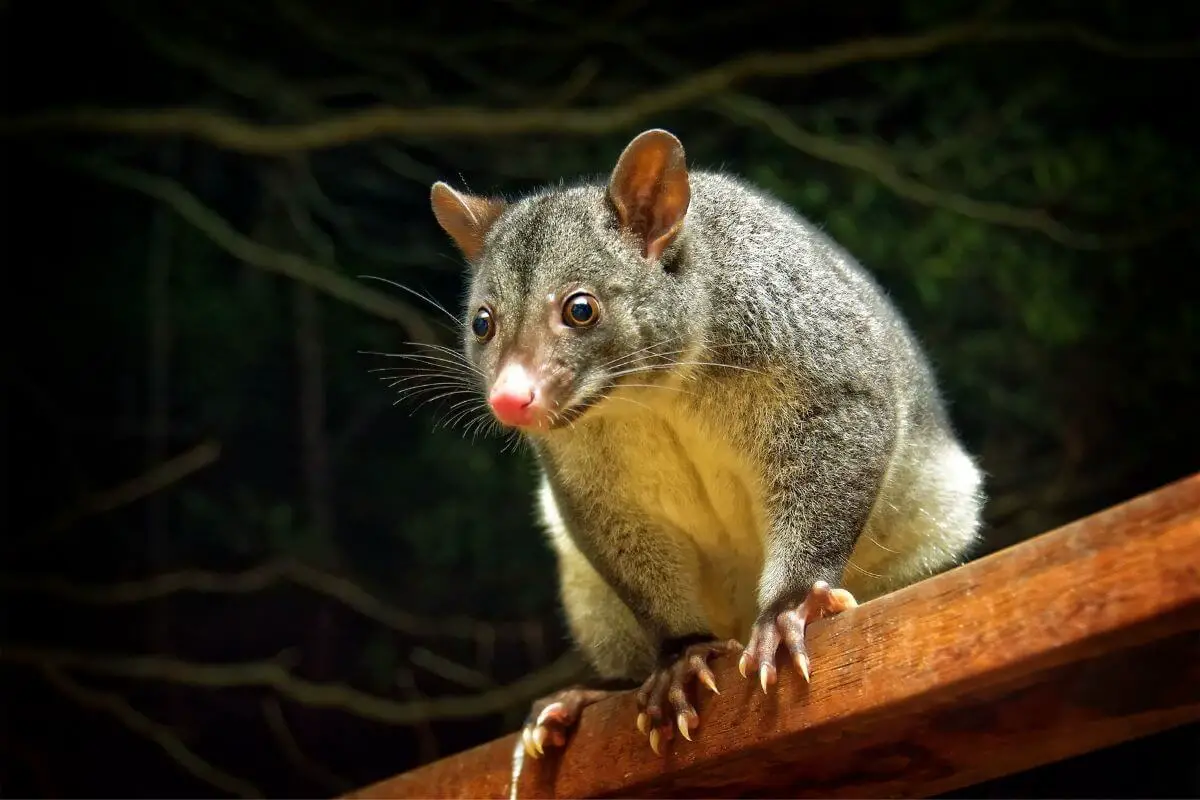Possums do eat chickens, but most commonly will target eggs, baby chickens and pullets. Fully grown possums have 50 teeth which are surprisingly sharp and can easily kill a small chicken or bantam within 5 seconds.
When raising chickens, one of the greatest threats to the well-being of your flock is the presence of a predator. Predators come in all shapes and sizes; birds of prey, such as hawks and eagles, often patrol the skies, while larger mammal predators like coyotes can attack your chickens from the ground.
Each predator has its own traits and behaviors that are essential to learning if you’re going to keep your chickens safe. In this article, we are going to focus on one of the more unexpecting predators: The possum.
Table of Contents
Do Possums Eat Chickens?
Even though they focus mostly on small prey, possums will take the opportunity to hunt down a chicken if the opportunity presents itself. They might not be the largest or most aggressive animals, but possums have a wide mouth of about 50 very sharp teeth that can take out a small chicken in just a couple of bites.

Because possums aren’t much larger than a house cat, they usually will only go for smaller hens, baby chicks and eggs when they enter a chicken coop to feed. Most adult chickens are too big for a possum to confidently attack, though smaller chickens and bantams are at a greater risk.
As they aren’t very aggressive, possums won’t usually take the initiative to attack a rooster as they know it might prove to be a more difficult meal.
Because they aren’t usually interested in a violent confrontation, it is usually out of desperation that a possum will attack chickens. It is most common to see these attacks when possums are starved and lacking another source of food, such as during the winter time when food is scarce.
What is a Possum?
Possums, or opossums, are the only native species of marsupial to North America and are commonly found throughout the United States, Canada and Australia. The term marsupial refers to the species’ most distinguishing trait of having abdominal pouches, in which female possums carry their offspring.
An adult possum is usually about the size of an average house cat, weighing in at about 6-12 pounds and averaging about 2 feet in length. Possums have a distinctly gray and white coat of fur, and have a long hairless tail.
They have long faces that come to a point at a pink nose with white whiskers. Their deep, black eyes and round black ears, which contrast a white face.
Possums generally prefer to live in densely forested areas, as they are scavengers and like to have a lot of options for food. Since they are omnivores, they typically eat a wide variety of food.
Possums are known to eat small animals such as mice, moles, snails, beetles, frogs, ants and many other small critters. They are also known to eat anything they can scavenge, varying from fruit, veggies, garbage, and even roadkill.
Signs of a Possum Attack
Possums are nocturnal animals, and so they will do most of their scavenging in the cover of night. They are often compared to raccoons in their behaviors of nighttime scavenging, but they usually have a much simpler approach.
While raccoons are able to overcome obstacles and even are able to work through some latches and locks, possums are easily deterred by these extra layers of security.
There are several telltale signs of a possum attack. If you’re sensing that something is causing your chickens distress or that there is even blatant evidence that one of your birds has gone missing, keep an eye out for some of these signs.
- Bite Marks – This is probably the most obvious of the signs. Check to see if any of your chickens have bite marks or wounds, and possums will usually go for the chicken’s breast or thigh.
- “Leftovers” – Although this is gruesome, it’s important to notice if there are any leftover chicken body parts that might’ve been torn off in the attack. It is very unlikely for a possum to eat the whole bird, so it is possible that there could be parts of the bird left as evidence.
- Droppings and crumbs – If a possum went to the lengths of getting into your chicken coop, it is more than likely they raided your other food supplies or trash. A possum will also be just as attracted to the chicken feed as the chickens themselves. Check to see if any crumbs or food waste have been left behind.
- Footprints – Possums have distinct paw prints due to their inner toe on their hind feet resembling a thumb. They only average about 2 inches in diameter and look almost like a human infant’s handprint.
- Eggs – Check to see if there are any small bits of egg shells, or eggs that have gone missing from the nests. Possums like to eat chicken eggs but will never eat the shell, so this is a good sign to look for.
How to Protect Your Chickens From Possums
The most important part of keeping your chicken coop safe from possums is improving your coop’s security measures. There are many ways to secure your coop against possums, and most of them will benefit your flock’s safety from chicken predators in general.
As mentioned earlier, possums lack the craftiness that raccoons have, and won’t be able to get through locks and latches. Locking up your fencing helps prevent possums from opening gates. Another way of reinforcing your coop’s fences is by adding a layer of wire mesh that has smaller holes. Possums can sneak through small points of entry, even sneaking through small holes in chicken wire, so having that extra barricade of strong hardware cloth will make a great difference.
Since possums prefer to hunt at night, adding several motion-sensing lights will be essential to scaring possums away when they do appear. Possums also prefer to avoid loud environments, so turning on a radio near your coop could be a good idea.
Finally, once you’ve added some of these extra security measures, it’s important to remember to always shut your coop’s pop door at night. Even though a properly fenced and secured coop will feel safe, keeping your hen house closed up tight at night is often the best way of keeping the predators out and your hens safe inside.
What to do if You Encounter A Possum
If you happen to see a possum near your coop, the best thing to do is usually to let it be. Possums in general aren’t dangerous to your chickens, and can in fact be valuable to your garden’s ecosystem. Possums are sooner to eat pesky rodents and bugs, and aren’t likely to carry rabies due to their strong immune system. As long as they keep their distance from you and your coop, possums are easy to coexist with.

In the case that a possum has found its way into your chicken coop, don’t panic. More often than not, a possum is more likely just as scared as you are and will not show aggression. It is best to contact animal control to safely remove the possum from your property, but usually, they will move on their own if prodded gently with a long pole or broom.
Setting up live traps is another great way of safely capturing the possums and removing them from your coop. Always take caution when interacting with wild animals regardless of how nonaggressive possums might seem.
Overall, possums are a unique part of the ecosystem that usually don’t pose a threat to humans or chickens. Even though a possum might try to eat a chicken if it is desperate for food, more often than not, they will prefer to search your gardens for smaller meals.
If possums have already broken into your coop, the best thing to do is to reevaluate your current setup and add extra security. Your flock will usually be safe around possums, and your gardens will thank you for having the possums around to get rid of other pests.

